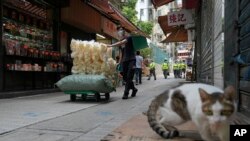Since the pandemic began, Hong Kong has adopted Beijing’s approach of a “zero-Covid” policy. This has previously been enforced with quick measures to eradicate infections and lengthy quarantines for arrivals.
The strategy has had some success, but the high transmissibility of the omicron variant has seen Hong Kong with more cases this year than both 2020 and 2021 combined. The contagious variant has led to some health experts in the city dismissing the possibility of the city achieving zero-Covid again.
Respiratory disease specialist Dr. Leung Chi-Chiu believes Hong Kong will continue its strategy of achieving zero-Covid, but first, he says, the city needs to achieve herd immunity.
“The massive omicron outbreak would immunize a major portion of our population to slow down its own spread within at least three months,” he says. He says that will partially compensate for the recent relaxation of social distancing requirements.
Ultimately, Dr. Leung says, Hong Kong still needs extensive testing, isolation and quarantine “to hopefully achieve zero-Covid before the herd immunity again wanes."
TESTING SCHEME ON HOLD
Hong Kong Chief Executive Carrie Lam announced new measures on Monday as the city continues its battle against the fifth wave of the coronavirus, dominated by the omicron variant. After the leader recently admitted there is a fading tolerance among the population of continued restrictions, she announced that from April 1, flight bans – including from the U.S. and Britain – will be lifted while fully vaccinated arrivals will only have to quarantine for 7 days in quarantine hotels, down from 14 days.
The recent announcements add to the mixed messaging in recent weeks from the government, who have teased a possible citywide lockdown before Lam ruled it out. But the uncertainty has seen residents panic buying from supermarkets, leaving some shelves in stores empty.
“Lockdown plus mass testing has never been tried successfully to terminate transmission of COVID-19, not to mention omicron, beyond the early stage of outbreak,” said Dr. Leung.
“Despite initial enthusiasm from some local groups and widespread wish of the general public to terminate the outbreak quickly, the harsh scientific reality and lack of type of community infrastructure support in Mainland [China] forced the local government to abandon the mass testing at least for the time being,” he added.
LOW VACCINATIONS ELDERLY
But while the universal testing scheme is on hold, Lam says the government is still attempting to boost vaccination rates. Experts agree that one of the main reasons Hong Kong is suffering from a spike in coronavirus cases is because the numbers of vaccinations amongst vulnerable residents isn’t high enough.
Just over 68% of residents between ages 70 and 79, and only 39% of those over 80 years old have received two doses of coronavirus vaccinations, according to government data.
Professor David Hui, of the Chinese University of Hong Kong and a pandemic advisor to the Hong Kong government, says the low numbers can be attributed, in part, to hesitancy on the part of residents.
“There were several months without a local case last year after the fourth wave and people didn’t feel the threat and need for earlier vaccination. Ten percent of children of the elderly have signed against vaccination of their parents,” Hui told VOA.
But Hui was upbeat about the government’s response to boost vaccinations.
“They have mobile vaccination teams going to nursing homes and disabled homes in recent weeks with [a] good response.”
Hong Kong has administered over 14.5 million doses of coronavirus vaccines, but recently passed a grim milestone of over 1 million total infections. The Chinese territory currently has the highest death rate from Covid in the world, according to the website Our World in Data.
Tuesday saw another 245 coronavirus deaths. Since the pandemic began Hong Kong has recorded 6,364 deaths caused by the virus.






